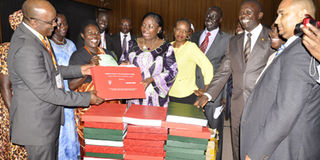Kadaga backs farmers’ petition to scrap taxes on agro inputs

Speaker of Parliament Rebecca Kadaga receives the farmers’ petition from the coordinator of Civil Society Budget Advocacy Group, Mr Julius Mukunda, at Parliament yesterday. PHOTO BY GEOFFREY SSERUYANGE.
What you need to know:
Farmers say the proposed taxes will lead to a decline in agricultural production, increase food and agricultural commodity prices.
Speaker Rebecca Kadaga yesterday backed more than one million farmers who have signed a petition opposing the proposed imposition of taxes on the agriculture sector.
Ms Kadaga told journalists after receiving the petition signed by the farmers, MPs and the Civil Society Budget Advocacy Group (CSBAG) that the proposed taxes will hurt the country’s economy. “I am also a farmer, these taxes will frustrate the farmers but we are handling the petition as Parliament,” Ms Kadaga said before she forwarded it to the Parliamentary committees of Finance and Agriculture for scrutiny.
The committees shall be expected to report back to Parliament on the recommendations before the House makes a final resolution on the matter.
Ms Florence Tumuheirwe, a farmer from Kabale, said imposing such taxes will lead to a decline in agricultural production, increase food and agricultural commodity prices, lead to a decline in exports and affect the poor more than the rich.
“Taxing agricultural inputs is inconsistent with government’s position to modernise agriculture. The medium term objectives for the financial year 2014/2015 includes enhancing agricultural production and productivity and to encourage the use of improved seeds and fertilisers, which remains low at only 24 per cent and 7 per cent, respectively,” Ms Tumuheirwe said.
“Not only do they [taxes] contradict the NRM manifesto but the current proposal on agriculture completely abrogates the Kyankwanzi resolution of October 2011, Vision 2040 and the President’s four-acre strategy,” she added.
The farmers noted that agriculture is the only sector in Uganda with a direct impact on poverty reduction.
“It should, therefore, follow that any strategy for sustained growth must centre on rapid growth of the agricultural sector. This is deemed unachievable with the imposition of all the agricultural taxes,” said Ms Tumuheirwe.
“Lower seeds and inputs use will result into lower yields leading to low crop production which in turn reduces supply with implications on food security,” Mr Julius Mukunda, the CSBAG coordinator, said.
Agriculture minister Zerubabel Nyiira yesterday said “as government, we are waiting to hear from Parliament before we can conclude. The idea was put to the public through MPs and it is up to them to consider the proposal although some people are being opportunists”.
The ministry of Finance spokesperson, Mr Jim Mugunga, also maintained that the budget speech was agreed upon by the Executive arm of government.
The President while addressing the NRM parliamentary caucus recently told MPs that the matter of agricultural tax proposals would be reviewed. On June 12, Finance minister Maria Kiwanuka introduced proposed new taxes on agricultural inputs and terminating tax exemptions on the sector.
Others included termination, with effect from July 1, of VAT zero-rated supplies including supply of machinery and tools for agriculture and supply of seed, fertilisers, pesticides and hoes, removal of tax exemptions on agricultural loans.




